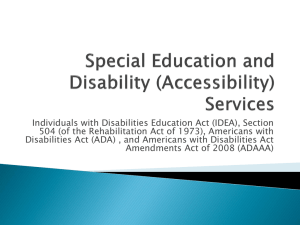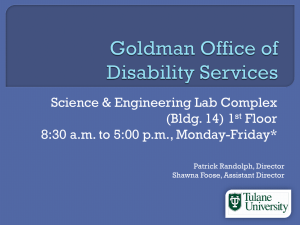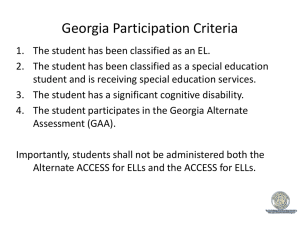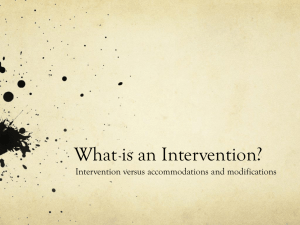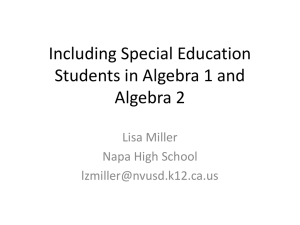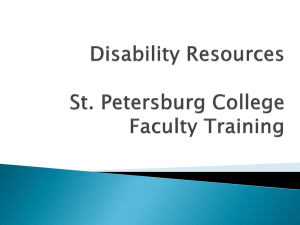Support Services - Hicksville Public Schools / Homepage
advertisement
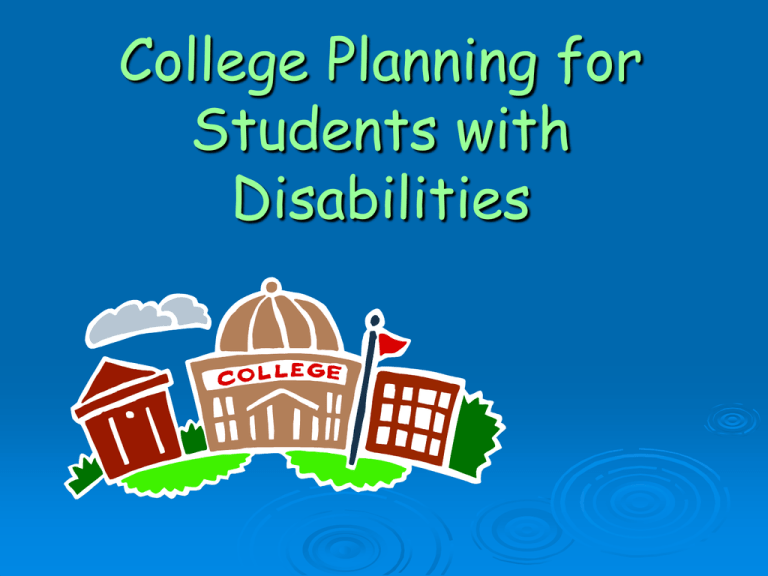
College Planning for Students with Disabilities Disability Legislation The Rehabilitation Act of 1973, Section 504, Subpart E: Requires that an institution which receives any federal financial assistance be prepared to make appropriate academic adjustments and reasonable modifications to policies and practices in order to allow the full participation of students with disabilities in the same programs and activities available to non-disabled students. What is Section 504? Civil rights, anti-discrimination statue Ensures that people with disabilities are not denied equal access or benefits from any federally funded program or activity Disability: physical or mental impairment which substantially limits major life activity (e.g. education) Student must be “otherwise qualified” (meet usual academic requirements for admission or participation in program) How Does 504 Protect You? No admissions quotas No disclosure requirements “Reasonable accommodations” in program, instruction, and testing Differences Between High School and College Less time in class, less access to teachers More time spent studying Larger class sizes (will vary depending on colleges) Mostly long-term assignments (not daily homework) Not as much teacher feedback More objective grading – not based on effort or improvement Teaching style more likely to be straight lecture Hard to balance social life and academics Admissions Tests With proper documentation, students with disabilities may take standardized college admissions tests, such as the PSAT, SAT, and ACT with individually determined accommodations. Obtain an SSD form VESID VESID – is the office of Vocational and Educational Services for Individuals with Disabilities. VESID counselors can help: Plan for your career Obtain job coaching Get training to achieve your work goals Find a job that matches your abilities, interests, and needs Work with your employer or college to make sure you receive reasonable accommodations when you need them. 11th grade students are invited to a group presentation with a VESID counselor in February 12th grade students meet individually with a VESID counselor in December or January Making the Match: Does the college match your needs? Degree and Vocational Options Extra-Curricular Programs and Internships Size/Location/Student Body Support Services Diagnostic Testing Special Advising Modifications/ Accommodations Information you should know about yourself: Your type of disability and how it affects your learning Activities you are good at and/or like doing The support services and accommodations you used in H.S. The support services and accommodations you plan to use in college Questions to Ask When Researching Colleges What types of academic accommodations and assistive technology are available? How do I acquire support services? Tutors, alternative testing, note takers, etc. Is a reduced course load possible if needed? Are there placement tests? Is there a cost associated with any support service? Application Process Students with disabilities may consider the option of disclosing their disability during the application process This allows the student the opportunity to provide the admissions committee with additional insights. The College Admissions Process The student should apply through the Undergraduate Admissions Office Some schools ask if you have a disability on the application but it cannot be a mandatory question. Meet with the disabilities coordinator to discuss accommodations Provide appropriate and current documentation Required Documentation A copy of your psycho-educational testing must be handed in to the college must be comprehensive and current – less than three years old – and must include diagnosis Minimum testing: IQ test (WAIS-III) and achievement test (WIAT-II) IEP’s, triennial reports and 504 plans are not considered appropriate documentation in college This is because college presents different demands than in high school and the nature of the disability may change. Documenting your Disability Must be prepared by an appropriate professional: medical doctor, psychologist, or other qualified diagnostician The college will not pay for the updating of required documents Types of support services Each college determines the types of disability support services that will be available It Typical accommodations include tutoring, note taking, alternative testing accommodations, computer access, and other assistive technology is important to meet with the coordinator for services as early as possible if you are anticipating using accommodations. High School Vs. College ◊ The student must meet the college’s admissions standards ◊ Student is responsible for seeking and using accommodations ◊ Student is responsible for obtaining evaluation and developing their plan ◊ College communicates with student: not parents! ◊ Students must be their own advocates Advocate for yourself Once the student has been admitted to a college, it is the student’s responsibility to selfidentify and provide documentation of the disability. No one holds your hand in college or makes decisions for you. It is up to you to take charge now. You must: Identify your needs Document your needs Request accommodations to meet your needs Utilize the accommodations appropriately Be Proactive Introduce yourself to each of your professors in the beginning of each semester to discuss how you will use your accommodations in each class Comprehensive Services Vs. Programs Support Services are the resources available at no cost for students with disabilities. They include core accommodations, such as extended testing time. Accommodations are required by law. Other examples include sign language interpreters, course materials in accessible forms, accessible parking and classrooms. Comprehensive Programs Vs. Services Programs are specifically designed for students with disabilities and provide more in-depth services and accommodations. The most common type are programs for students with learning disabilities and ADD/ADHD. These programs usually have costs in addition to tuition. They often provide one-one-one tutoring and advisement with a learning disability specialist. Not all colleges have programs. Basic Program: “Reasonable Accommodations” Basic testing and program accommodations Learning or writing centers available to all students Disclose disability upon admission Disability contact person wears many hats and may have no specialized training Almost every college offers at least these services Moderate Program Learning Centers specifically for students with disabilities Mix of peer and professional tutors Support with writing or study skills Testing and program accommodations May be a fee Nassau, SUNY Albany, American U., Fairfield U., Drexel U., NYU, Syracuse U., U. of Wisconsin, U. of Hartford, Marist College Comprehensive Program Coordinator has expertise in LD and ADD Wide range of tutorial supports Structured and individualized approach Advisement and early registration Frequent monitoring of student progress Limited “slots” – special application, apply early May be a substantial fee May have summer transition program for freshmen Adelphi U., CW Post, Hofstra, Northeastern U., U. of Arizona, Curry College, Lynn University, Boston University, U. of New England Students Must Know Themselves: Understand and be able to describe their strengths and weaknesses Understand their disabilities and the accommodations they need Develop academic and career goals Develop and use effective strategies for studying, test preparation, and time management Develop and contain a file of current school records and disability documentation information Key Factors to Student Success Level of Interest Motivation Independence Self-Direction Self-Advocacy Skills Knowledge about Self Academic Abilities Acquiring Information about College Programs and Services Utilizing Appropriate Resources for Support Any Questions?
